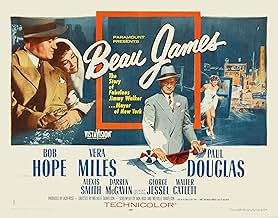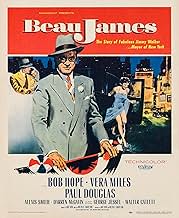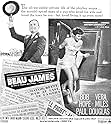AVALIAÇÃO DA IMDb
6,6/10
505
SUA AVALIAÇÃO
Adicionar um enredo no seu idiomaBiopic of the political career of Jimmy Walker, flamboyant and somewhat corrupt Mayor of New York City from 1926-1932.Biopic of the political career of Jimmy Walker, flamboyant and somewhat corrupt Mayor of New York City from 1926-1932.Biopic of the political career of Jimmy Walker, flamboyant and somewhat corrupt Mayor of New York City from 1926-1932.
- Direção
- Roteiristas
- Artistas
Eric Alden
- Reporter
- (não creditado)
Babette Bain
- Puerto Rican Child
- (não creditado)
Russ Bender
- Reporter
- (não creditado)
Jack Benny
- Jack Benny
- (não creditado)
John Benson
- Photographer
- (não creditado)
- Direção
- Roteiristas
- Elenco e equipe completos
- Produção, bilheteria e muito mais no IMDbPro
Avaliações em destaque
Having watched this movie many times -- it's in my library, I firmly believe that the role could only have been played by Bob Hope. To my mind, this is his best performance. That coupled with an excellent cast, highlighted by the duet with Jimmy Durante (and Jack Benny's cameo) make this a thoroughly enjoyable movie to watch -- just for fun. >
This is the closest thing to a good dramatic performance Bob Hope ever gave...and its pretty good. Of course, the film soft pedals and simplifies: Walkers great antagonists, Seabury and LaGuardia, barely appear in it. In fact, there is a great dramatic and tragic film waiting to be made of the Jimmy Walker story, with terrific roles for the actors who would portray the "little flower' LaGuardia, and the incorruptible, if cold -hearted, "man who rode the Tiger", Seabury, as well as Jimmy Walker ( not to mention his wife and mistress). Maybe Scorsese could do it someday.
Based on the charmingly cleaned up biography of a minor but colorful figure in New York history, sometime songwriter/Mayor James J. ("Gentleman Jimmy") Walker, this unjustly neglected Paramount film was a healthy success in its day but has not (as of this writing) been made available on DVD despite an outstanding cast and ties to truly remarkable figures in entertainment and history. One of Bob Hope's warmest, most thoughtful performances, it should be rescued from the occasional "fool screen" broadcast and made available in a good VistaVision release reflecting the original.
The no less fictionalized musical biography of Walker's successor as Mayor of New York, Fiorello H. LaGuardia (the sadly unfilmed FIORELLO), won a Pulitzer Prize and tied with THE SOUND OF MUSIC for the Tony as Best Musical of 1959, but Fowler's biography of Walker with Hope in the lead (looking nothing like Walker, but beautifully capturing Fowler's idea of Walker's character) was as good as it got for Gentleman Jimmy - the less well cast 1969 musical (JIMMY, inflicted on Broadway by movie mogul Jack L. Warner) suggested by the same book but with far less skilled hands writing (BEAU JAMES' director, Melville Shavelson was one of the writers) died a painful death in just over two months (October 23, 1969-January 3, 1970, at the Winter Garden Theatre after a tryout at Philadelphia's Forrest Theatre; a long out-of-print Broadway Cast Album of the enjoyable but uneven score on RCA LSO 1162 is all that survives.) In the movie, the glamorous Alexis Smith (Tony Award, Best Actress in a Musical for 1971's FOLLIES) furthered her reputation as Hollywood ice princess as Walker's unappreciated but sympathetic wife, Allie, and had to work hard to allow audiences to believe that Bob Hope's finely layered but (on screen anyway) naive Walker would leave *her* for Vera Miles higher billed chorus girl, Betty Compton.
The film does make New York at the end of the "Roaring Twenties" almost a co-equal character in the piece, and appearances of several real life characters from the era (Jimmy Durante, Jack Benny and others) add to the impression beautifully - as does the deft narration from Fowler's book appropriately read by Walter Winchell.
It isn't great history or even great Hollywood, but it is a very warm, enjoyable film well worth a look - and a great example of how "bad" casting (Hope's lack of *physical* resemblance to Walker) can be brilliant if it gets the *psychology* right. When they tried to musicalize the idea a decade later, the production was probably dead the moment they cast the skinny impressionist/actor Frank Gorshin (who actually did bear a passing resemblance to Walker) in the Hope role. All the qualities Gene Fowler infused in his book (to MAKE the reader and later, viewer of the movie, feel "warm and forgiving all day long") disappeared. The movie understood this - and you will.
The no less fictionalized musical biography of Walker's successor as Mayor of New York, Fiorello H. LaGuardia (the sadly unfilmed FIORELLO), won a Pulitzer Prize and tied with THE SOUND OF MUSIC for the Tony as Best Musical of 1959, but Fowler's biography of Walker with Hope in the lead (looking nothing like Walker, but beautifully capturing Fowler's idea of Walker's character) was as good as it got for Gentleman Jimmy - the less well cast 1969 musical (JIMMY, inflicted on Broadway by movie mogul Jack L. Warner) suggested by the same book but with far less skilled hands writing (BEAU JAMES' director, Melville Shavelson was one of the writers) died a painful death in just over two months (October 23, 1969-January 3, 1970, at the Winter Garden Theatre after a tryout at Philadelphia's Forrest Theatre; a long out-of-print Broadway Cast Album of the enjoyable but uneven score on RCA LSO 1162 is all that survives.) In the movie, the glamorous Alexis Smith (Tony Award, Best Actress in a Musical for 1971's FOLLIES) furthered her reputation as Hollywood ice princess as Walker's unappreciated but sympathetic wife, Allie, and had to work hard to allow audiences to believe that Bob Hope's finely layered but (on screen anyway) naive Walker would leave *her* for Vera Miles higher billed chorus girl, Betty Compton.
The film does make New York at the end of the "Roaring Twenties" almost a co-equal character in the piece, and appearances of several real life characters from the era (Jimmy Durante, Jack Benny and others) add to the impression beautifully - as does the deft narration from Fowler's book appropriately read by Walter Winchell.
It isn't great history or even great Hollywood, but it is a very warm, enjoyable film well worth a look - and a great example of how "bad" casting (Hope's lack of *physical* resemblance to Walker) can be brilliant if it gets the *psychology* right. When they tried to musicalize the idea a decade later, the production was probably dead the moment they cast the skinny impressionist/actor Frank Gorshin (who actually did bear a passing resemblance to Walker) in the Hope role. All the qualities Gene Fowler infused in his book (to MAKE the reader and later, viewer of the movie, feel "warm and forgiving all day long") disappeared. The movie understood this - and you will.
The life of Jimmy Walker would make a great film. It could be a tragedy in the Greek tradition - a man of many gifts with a single fatal flaw. A pretty good, though short-lived, musical Jimmy, was on Broadway in 1969 for about 85 performances. It had a good score, excellent casting and quite a story..... it missed it's audience though - theater goers in the late sixties were played out on musicals of the past, and didn't want to hear about politicians not attending to duty.
The film does well to capture the spirit of the 1920s via the 1950s, and stays true to Gene Fowler's memorable biography. Hope is an inspired choice for the tin pan alley songwriter turned politician.
Alexis Smith does a good job. And its always a pleasure to see Jimmy Durante, that well-dressed man.
Though pretty one-dimensional, it is good this film was made if only to chronicle the story of a man who really could have done great things, if he'd only paid attention to business and not got caught up in extra-marital problems and suspect financial transactions made by friends on his behalf.
The film does well to capture the spirit of the 1920s via the 1950s, and stays true to Gene Fowler's memorable biography. Hope is an inspired choice for the tin pan alley songwriter turned politician.
Alexis Smith does a good job. And its always a pleasure to see Jimmy Durante, that well-dressed man.
Though pretty one-dimensional, it is good this film was made if only to chronicle the story of a man who really could have done great things, if he'd only paid attention to business and not got caught up in extra-marital problems and suspect financial transactions made by friends on his behalf.
After seeing "Beau James" I was left wondering..."why would they want to make a movie out of THIS??". After all, Mayor Jimmy Walker was far from being honest or virtuous. And yet, oddly, the film is trying to say that he was KINDA these things.
The film is a Hollywoodization of the career of Jimmy Walker (Bob Hope) once he became mayor of New York City. Mostly, it shows him worried about his wardrobe, taking bribes and being a man adored by New Yorkers. But, the object lesson appears to be "He wasn't nearly as dishonest as he could have been!". Huh?
For me, by the time the movie ended I was left with a strange sense of confusion. Why was Walker worthy of a biopic? And, why should I care about his love life? And, was Bob Hope playing Walker...or Bob Hope?
The film is a Hollywoodization of the career of Jimmy Walker (Bob Hope) once he became mayor of New York City. Mostly, it shows him worried about his wardrobe, taking bribes and being a man adored by New Yorkers. But, the object lesson appears to be "He wasn't nearly as dishonest as he could have been!". Huh?
For me, by the time the movie ended I was left with a strange sense of confusion. Why was Walker worthy of a biopic? And, why should I care about his love life? And, was Bob Hope playing Walker...or Bob Hope?
Você sabia?
- CuriosidadesThis was Bob Hope's last film for Paramount Pictures.
- Erros de gravaçãoMayor Walker is in a parade near movie's end. In the background is a 1955 or 1956 Cadillac.
- Citações
Mayor James J. 'Jimmy' Walker: Goodbye... but remember this: the voters always get what they deserve. I wasn't the only chump in this city. It took a lot of you to elect me.
- ConexõesFollows A Canção da Vitória (1942)
Principais escolhas
Faça login para avaliar e ver a lista de recomendações personalizadas
- How long is Beau James?Fornecido pela Alexa
Detalhes
- Data de lançamento
- País de origem
- Idiomas
- Também conhecido como
- Beau James
- Locações de filme
- Empresas de produção
- Consulte mais créditos da empresa na IMDbPro
Bilheteria
- Faturamento bruto nos EUA e Canadá
- US$ 1.750.000
- Tempo de duração1 hora 45 minutos
- Proporção
- 1.85 : 1
Contribua para esta página
Sugerir uma alteração ou adicionar conteúdo ausente

























